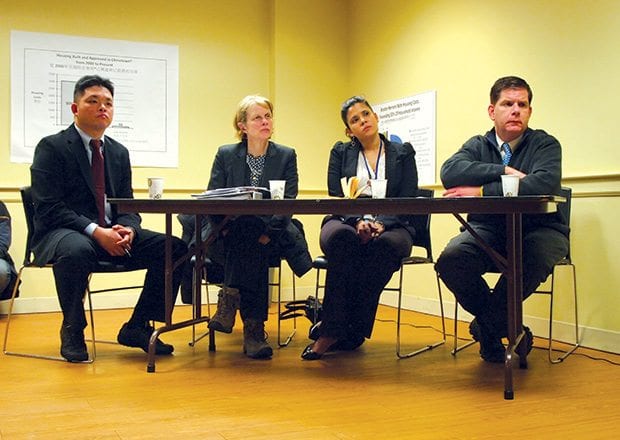

Former Chinatown resident Yong Sheng Huang describes how he was forced out of his apartment and became homeless.
Last Wednesday, housing activists in Chinatown met with Mayor Marty Walsh and members of his administration seeking help in stemming the displacement of low-income residents of the city’s densest neighborhood.
Saturday, the activists were on streets in Chinatown with a demonstration aimed at calling attention to the housing crisis the Chinese population is facing in the neighborhood where rising rents and luxury high-rises are forcing many to leave.
At Wednesday’s meeting, restaurant worker Yong Sheng Huang, speaking through an interpreter, was one of many who spoke about losing an apartment, and moving to a homeless shelter far from the community where restaurant work and the Cantonese language make life in the United States possible for his family.
“My hope is to come back to Chinatown,” he told Walsh. “We don’t speak English. There aren’t a lot of options.”
Activists with the Chinese Progressive Association and the Boston Tenant Coalition are asking the Walsh administration to build more affordable housing in Chinatown on parcels of vacant, publicly-owned land, to require developers to build more affordable housing when they construct new luxury housing and to change the income guidelines for affordable housing to better reflect the incomes in Chinatown, where most workers earn less than $20,000 a year.
Rents in the neighborhood are now as high as $2,000-$3,000 per unit.
“There are tenants who are tripling up in units,” said Mark Liu. “People are living in substandard units in order to stay in the neighborhood.”
For many low-income Chinese immigrants, living in Chinatown is the key to surviving in the Greater Boston area. They can shop and obtain services speaking their native language. And restaurants that employ them as cooks and dishwashers send vans to the neighborhood to transport them to work.
To date, most of the new construction in Chinatown has been geared toward high-income homebuyers. Since 2000, 3,059 luxury units have been built or approved for construction in Chinatown, while only 98 low-income units have been built or approved for construction.
Meanwhile, landlords in older buildings have been squeezing out low-income tenants to make way for an influx of young professionals and students, Chinatown activists say.
Although the city requires developers to set aside 15 percent of their units for affordable housing, most developers opt out of that requirement by paying into the city’s Affordable Housing Trust. Because the city only requires developers to pay $200,000 per unit of affordable housing, it’s more profitable for developers of luxury units to pay into the fund than to set aside units in their building as affordable.
In his remarks to the Chinatown residents, Walsh agreed to examine the inclusionary zoning requirements and prioritize affordable housing projects on public land in the neighborhood.
Walsh said the neighborhood’s housing issues are not unique. He has convened a housing transition team that will soon be issuing a report with recommendations on how to tackle some of the city’s most pressing housing issues.







